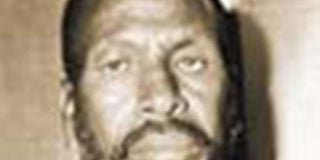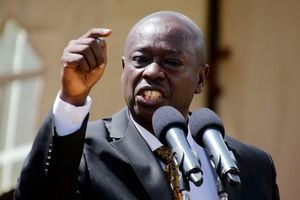How Karumba's pursuit of debtor led to his death

Kung’u Karumba, he was one of the Kapenguria Six. He was killed in Uganda. PHOTO | FILE | NATION MEDIA GROUP
What you need to know:
- The maximum time one could disappear in Uganda those days and have a chance to be found alive was 15 minutes!
- The practice in Uganda those days was to tie the body to a heavy stone and throw it into River Nile or Lake Victoria where it would either be eaten by crocodiles or would sink.
Of the Kapenguria Six, Jomo Kenyatta became President at independence.
Achieng Oneko and Paul Ngei were appointed to the Cabinet while Bildad Kaggia and Fred Kubai served as assistant ministers.
Kung’u Karumba, the last of the six, had no appetite for politics. He wanted to be appointed District Commissioner.
However, Mzee Kenyatta reasoned it was the wrong choice for a career on account of Karumba’s advanced age — he was 61 — and his challenged academic background.
He advised Karumba to go back to business which is what he was doing before they were carted away to colonial imprisonment.
In a short time, he had set up a thriving public transport company with a fleet of long-distance buses.
To his portfolio he soon added bulk oil haulage from the port of Mombasa to Kampala and Bujumbura. Then he veered to garment manufacturing and set up a textile factory in downtown Nairobi.
MISSING
Uganda turned out to be the most profitable outlet for his textile products.
On June 14, 1974, he left Nairobi in a brand new Toyota Hilux pickup, registration KPW 301, straight from the showroom. With him was his 19-year-old son Peter Karanja.
In Uganda, he was hosted by a Kenyan business couple, Ibrahim Mungai and his wife Susan Wamaitha.
But a day later, the freedom fighter disappeared in the Ugandan town of Jinja, never to be found.
Twenty-six years after the incident, Mungai came to the Nation newsroom and, for the first time, disclosed what transpired. I reproduce the story as I recorded it from him at the time.
"On arrival in Uganda, Karumba and his son came straight to our home in Bugembe about two kilometres from Jinja town where we had supper.
He brought my wife a gift of a handbag in appreciation of the assistance she had given him during the previous trip. My wife briefed him about the progress she had made in collecting his debts.
DEBT
But, in the case of one debtor, a woman called Margaret, who was a mistress to a senior Ugandan military officer, my wife advised that Karumba seek the assistance of the police to get his money as she was proving unwilling to pay her debt.
Karumba said he would first approach her alone but report her to the police if she became difficult.
On his way back to Jinja that evening, he passed by Margaret’s shop only for her to snub him. He right away proceeded to report the matter at Jinja Police Station.
The officer on duty, a police inspector, told Karumba to return in the morning and they would go see Margaret together.
Come morning, Saturday June 15, Karumba and his son came straight to our house for breakfast.
My wife agreed to accompany them to collect the money owed by the troublesome Ugandan woman. They left in Karumba’s pickup truck.
THREATS
Their first stop was Jinja Police Station. They waited for an hour but the police inspector with whom Karumba had an appointment didn’t show up.
The latter lost patience and told my wife he was going to confront Margaret alone. My wife accompanied him to her shop.
When she saw Karumba, she shouted at him from a distance: “Why do you keep coming here? I will report to my husband that you’re disturbing me!”
Unmoved, Karumba walked straight up to her and said: “Forget about your husband: Just look at me well, I am President Kenyatta’s brother; if you don’t pay my money I’ll report this matter to (Ugandan) President Amin himself!’ There and then, Margaret dialled a number and said in Luganda: “Nguudi jaree” (Is he there?). “Bwaja mugambe muita” (Tell him I am calling him).
Knowing how things were in Amin’s Uganda at the time (the President was a murderous dictator presiding over a lawless country), my wife smelt danger and suggested that they go away and check whether the police inspector with whom Karumba had an appointment had come back.
ANXIOUS
Karumba reluctantly agreed to leave. On their way out, my wife suggested that they first pass by the Kenya Cooperative Creameries (KCC) milk depot to pick up supplies for our family shop before they proceeded to the police station.
They did not find parking space at the milk depot and Karumba suggested that my wife and his son disembark to collect the milk as he drove round the depot once to see whether one of the vehicles in the queue would be done with loading and move out to create space.
Half an hour later, Karumba had not returned to the depot parking bay. My wife got concerned and decided to check around.
Karumba was nowhere to be seen. She hired a taxi to take the milk to her shop but, together with Karumba’s son, remained at the depot waiting.
An hour later, the freedom fighter or his vehicle were nowhere to be seen. My wife didn’t like the turn of events and decided to come straight home to brief me.
WAITING TIME
Unfortunately, I wasn’t at home and, without mobile phones those days, my wife had no way of reaching me. She helplessly waited at home.
When I finally got home, she couldn’t wait for me to alight from my car to brief me on the events of the day.
On hearing her out, I couldn’t help making the sad conclusion that the worst could have happened.
The maximum time one could disappear in Uganda those days and have a chance to be found alive was 15 minutes!
When one disappeared for half a day, as Karumba had, his next of kin would be lucky to get even the dead body!
I drove madly from my home to Jinja. First I went to the hotel were Karumba was staying on a remote chance he could be resting in his room. No luck.
I found two other Kenyans, one Peter Muchiri and a girl named Ann Nyokabi, waiting for him. The three of us jumped into my car and sped to Jinja Police Station.
JOMO NOTIFIED
We found three drunk officers who recorded our report on a piece of paper. From there we rushed to my home to alert authorities in Kenya.
Karumba was a senior citizen and we definitely knew the Kenya government would take up the matter at the highest level.
I telephoned Karumba’s business partner, Muhu wa Kang’ari, with whom he owned the largest abattoir in Nairobi’s Dagoretti meat market.
The latter immediately got in touch with Dr Gikonyo Kiano, a Cabinet minister in the Jomo Kenyatta government, who informed the President that his old Kapenguria colleague had gone missing in Uganda.
Events unfolded very fast. Just before five in the morning, we were woken up by the screeching of tyres outside our gate.
When I peeped through the window, I counted up to eight army Land Rovers parked at our gate and thought: 'My God, they have come to kill us!'
I calmed a bit when I saw one Lt-Col Juma who happened to be my friend come out.
INVESTIGATIONS
I dressed up and went to the gate to inquire what was happening.
Lt-Col Juma told me President Kenyatta had telephoned President Amin in regard to Karumba’s disappearance, and the latter had ordered immediate investigations.
He asked me to go to Jinja Police Station where one of the dreaded aides to President Amin, Colonel Isaac Maliyamungu, was waiting.
I found him banging the table with his pistol and menacingly demanding to be given the statement I had recorded the previous evening on Karumba’s disappearance.
He told me President Amin had taken a personal interest in the matter and that the Ugandan army had been mobilised to search for Karumba.
He advised me to go back home and wait until he contacted me. I did as instructed and hoped for the best, though my crystal ball was that the worst had happened.
Early in the morning the following day, a barmaid who worked at my pub came to my house shaking.
MURDER
She told me a Ugandan army officer with whom she was having drinks the previous evening had confided in her that the day before, his colleagues had killed President Kenyatta’s “brother” who was troubling a girlfriend to their boss and dumped his body at Mabira Forest.
I jumped into my car and drove to the road leading to the forest.
I had a friend who operated a garage by the roadside and wanted to ask him whether, by any chance, he had seen a brand new pickup vehicle with a Kenyan registration drive by on Saturday.
He easily remembered having seen it pass by, driven by an army officer sandwiched between the driver and another army officer.
I decided to drive along the road just in case I might come across another useful clue.
Sure enough, just at the boundary of Madhvani sugar factory and Mabira Forest, I found some shirt wrappings I had seen in Karumba’s vehicle.
I picked six of them and sped back to Jinja Police Station to report the new development.
LAKE VICTORIA
The officer in charge at the station immediately alerted Col Maliyamungu. In less than an hour, the latter was at the station with army men in eight lorries.
The colonel asked me to lead the convoy to the place where I had collected the shirt wrappings.
When we got there, the officers were lined up across a radius of three kilometres and asked to comb the forest in search of Karumba’s body.
Eight hours later the body had not been found. But I could tell Col Maliyamungu was only putting up a show.
In the same week, a friendly Ugandan army officer confided in me that Karumba’s body had at first been dumped at Mabira Forest, where he was killed, but later collected to be disposed of where it would never be found.
The practice in Uganda those days was to tie the body to a heavy stone and throw it into River Nile or Lake Victoria where it would either be eaten by crocodiles or would sink far down never to be found."
POSTSCRIPT
When I first wrote the story, a person who didn’t give his name called the Nation offices and asked to talk to me.
He said the story, as told to me by Mungai, and corroborated by Karumba’s son who was with him in Uganda, was a fabrication by the Kenya government.
His version of events was that the freedom fighter met his end when he went to the home of a prominent politician and demanded his share of money allegedly paid by the British government as compensation to ex-Mau Mau fighters.
The politician wasn’t amused and ordered Karumba shot dead, his body buried in the politician’s compound, and a banana planted on top to conceal the grave.
I asked the caller how he got to know about it. He replied that at the time, he worked for the paramilitary GSU and was one of the guards at the politician’s private home.
I told him his was certainly an interesting story and said I wanted to sit with him to hear more of it.
He promised to call back and tell me where to meet him. Nineteen years later, I am still waiting for his telephone call.





